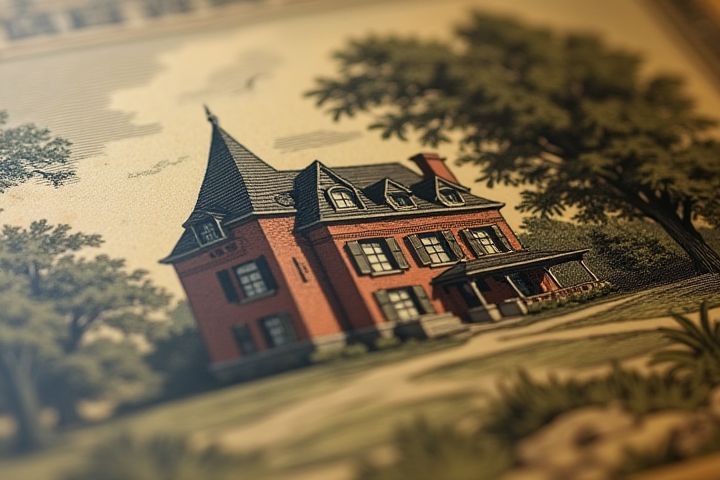
To find historical house records, you can start by visiting your local county assessor's office, where property tax records and ownership histories are maintained. Online resources such as the National Archives provide access to digitized historical documents, including land grants and property deeds. State libraries often house local history collections containing property records and maps that trace changes in land ownership over time. Historic preservation societies can also offer valuable insights and resources on homes significant to your community's history. Lastly, websites like Ancestry.com and FamilySearch.org might have databases that include historical property records connected to individual family histories.
Where To Find Historical House Records
Local county clerk's office
Local county clerk's offices serve as vital resources for historical house records, including property deeds, tax assessments, and zoning information. Many of these offices archive documents dating back several decades or even centuries, providing insight into the ownership and modifications of properties. You can typically access these records in person, or some counties may offer online databases where you can search by property address or owner name. To ensure a thorough search, verify your county's specific requirements and available resources before visiting or accessing the online portal.
County recorder's office
To locate historical house records, visit your local County Recorder's Office, where property documents such as deeds, mortgages, and liens are archived. These offices maintain comprehensive records that date back many years, providing insights into property ownership and transactions. You can often access these records in person or through their online databases, depending on the county's resources. Engaging with the staff can also yield assistance in navigating the archives and uncovering pertinent information about your property's history.
Property tax assessor's database
To locate historical house records, focus your search on the Property Tax Assessor's database, which typically contains detailed information on property valuations, ownership history, and tax assessments. Many county or municipal websites offer online access to their databases, allowing you to easily search by address, parcel number, or owner name. In the United States, this data is often publicly available, especially for properties over several years, enabling you to track changes in property value and ownership details. You may also consider visiting local tax assessor's offices if online resources are limited, where staff can assist you in accessing historical records.
Local library archives
Local library archives are invaluable for locating historical house records. Many libraries offer access to city directories, property tax records, and plat maps that detail ownership and property changes over time. You may find specialized collections or local history sections with documents dating back to the 18th or 19th century. Furthermore, engaging with librarians can help you navigate the archives effectively, uncovering rich stories and data related to your property's past.
Historical societies
To locate historical house records, your best resource is local historical societies, which often maintain extensive archives of property documentation and research. Many societies catalog original blueprints, photographs, and ownership history, making them invaluable for tracing a home's past. Some notable organizations, such as the National Trust for Historic Preservation, may provide directories or recommendations for specific regional historical societies. You can also explore online databases and digital archives that these societies might offer, allowing for easy access to valuable information from the comfort of your home.
State archives or repositories
State archives and historical repositories are essential resources for locating historical house records. You can access a wealth of documents, including property deeds, tax records, and land grants, which often provide extensive information about previous owners and modifications made to the property. Many state archives also digitize their collections, allowing you to research these records online from the comfort of your home. Don't overlook local historical societies, which may house unique records specific to your area, enhancing your exploration into the past of any home.
Online archival databases
Online archival databases are valuable resources for locating historical house records. Websites like Ancestry.com and FamilySearch.org offer extensive collections of property records, including deeds and tax assessments that can help trace the history of a specific residence. Local government websites often provide access to digitized archives of land records, allowing you to explore the ownership timeline of your property. Preservation organizations may also host online databases that compile historical data, photographs, and architectural information about homes in particular regions.
Federal Land Office records
To find historical house records, particularly from the Federal Land Office, start by visiting the Bureau of Land Management's General Land Office Records website, where you can access over 18 million land records. These resources include land patents, surveys, and tract books dating back to the late 1800s. Additionally, state archives and local county clerk offices often maintain F.G. paperwork along with maps and land transaction records. For personalized assistance, consider reaching out to local historical societies that specialize in regional property history.
Real estate websites with archives
Real estate websites such as Zillow and Realtor.com often feature archives that provide historical house records, including previous sale prices and property tax information. You can explore local government websites, which frequently maintain public access to property records, offering insights into a home's ownership history dating back decades. The National Association of Realtors provides resources that can guide you on how to locate historical data in specific regions. For detailed information, you can also access county assessor's offices or online databases like Property Shark, which aggregate extensive property histories.
Genealogy websites for property histories
Historical house records can be effectively accessed through dedicated genealogy websites such as Ancestry.com and FamilySearch.org, which offer comprehensive databases for property histories. These platforms provide valuable resources, including digitized property deeds, tax records, and old maps dating back to the late 19th century. You can also explore local government websites or historical societies that often maintain archives of municipal records, including land ownership. By utilizing these tools, you can uncover detailed information about your property's previous owners and its historical significance.
